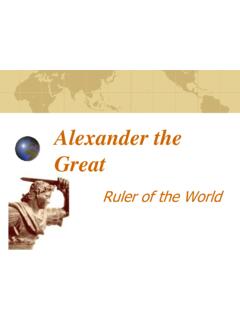Transcription of Introduction to Ancient Greece - Cabarrus County Schools
1 Introduction to Ancient GreeceGeographyBIG IDEA: Greece s geography and closeness to seas influenced their need for trade and independent city-states. Greece is on the continent of Europeand consists of many islands. The main part of Greece is a peninsulaSEAS: Mediterranean Sea (to the South), Aegean Sea, Ionian SeaMOUNTAINS: Mountains can be found all throughout Greece , making it difficult to develop as a whole, unified OF GEOGRAPHY, city-states had to develop independently[they were isolated]. These city-states were competitive with each otherCity-states were isolated, making the surrounding seas important for: Transportation trade with other civilizations and city-states. City-states are cities and the surrounding area that acted as their own countries AND have their own*Laws*Rulers*Government styles*MoneyEXAMPLES: Athens, Sparta, Corinth, Megara, Agora, Questions With Your Group!
2 Might the development of city-states cause rivalries within the same country? 2. How are the development of city-states different from river valley civilizations we have discussed? City-States Athens Athenswas the center of Power, Art, Science, philosophy Placed a heavy emphasis on education Philosophers Socrates, Plato, and Aristotle came from Athens. Birthplace of Democracy(around 508 ) Wanted to rule themselves and not have a king or queen! Democracy= Citizens have the right to vote for laws or leaders. ALL citizens can voteand have equal say in what happens. Sounds fair, right?City-States Athens -The trick was, the only people that could vote in Athens were the -You could only be a citizen if: You were a man born in Athens -So, only 50% or half of the people in Athens were citizens.
3 -The people not allowed to vote were:*Women*Slaves*People born outside of AthensActivity: Everyone stand up. Girls sit down. If you were born somewhere OTHER than Concord, sit down. These are the people who would be able to vote or make decisions for the whole : Sparta Focused on military strength, developing warriors, and power. Had their own army. Boys left home at age 7 to begin training. Conquered other city-states to gain wealth and power. Three classes of people:Citizens, non-citizens (women) , slaves Training to become strong and powerful soldiers was the point of education, not intelligence. City-States: Sparta You could only be a citizen if: You were a man born in Sparta However, in Sparta, women WERE allowed to: own land and businesses People who came to Sparta from other city states or countries could own businessesbut could NOT become citizensReview Questions With Your Group!
4 1)Why would sparta and athens be considered rivals? What are major issues they disagree on?2) How might both city-states go about promoting their culture?LeadersSocratesPlatoAristotleAle xander the Great Socrates was a philosopher of Ancient Greece . A philosopher is someone who tries to explain the nature of life. Socrates taught by asking questions. This method of questioning is still called the Socratic method. Plato was a student of Socrates. He started a school called The Academy. Plato s writing took the form of a dialogue between teacher and student. Aristotle was another Greek philosopher and student of Plato. He wrote about science, art, law, poetry, and government. Alexander the Great was the son of King Phillip II of Macedonia. Alexander conquered Persia, Egypt, the Middle East and Northern India.
5 As he conquered land he would spread Greek culture and achievements to the land and , other city-states began to adopt democracy as their main form of government. Alexander the Great helped spread Greek (Hellenistic) culture, which includes the democratic style of government. Trial By Jury was developed in Athens a group of citizens decides if a person is innocent or guilty of committing a crime after hearing all -spread of democracy Written Language The Greeks borrowed their alphabet from the Phoenicians. Most European languages, including English borrowed ideas from the Greek varied from region to region. oIslands, city-states, mountains separated areas, etc. Most areas were ruled either by a tyrant, oligarchy, monarchy, or : Ruled by one person, typically a king, queen, or : governmentbythepeople;a form of government where power is held by the people and exercised by them directly or by elected representatives.
6 (Athens)Oligarchy: Ruled by only few select people like strong military leaders. (Sparta)Tyranny: One person of higher wealth trying to hold political power. They ve taken their power illegally. Review Questions With Your Group!1)How have different forms of Greek government influenced governments today (not just )? WarsPeloponnesian WarPersian WarBattles Between Athens and Sparta 431 BC to 404 BC First war lasted 10 years: Sparta dominate land, Athens dominate sea. Athens built walls from the city to the sea in order to maintain trade, but they died due to disease. Second war: Spartans got help from other allies to conquer Athens. Asked the Persians to help. 405 BC Athens is defeated. Between Greece and Persia 492 BC to 449 BC Wars fought for power and control of more land.
7 Persian empire largest and most powerful at the time. Controlled land from Egypt to India. Ionians (Greeks along the coast of Turkey) enlisted help from other city-states but were defeated. Persia conquers other city-states to maintain control. Battle of Marathon: Persians had more soldiers than the Greeks, but Athens was able to defeat about 6,000 Persians and only lose 192 Greeks. Battle of Thermopylae:Greeks had a small army led by Sparta king Leonidas and 300 Spartans. Greeks had Persians blocked until the Persians figured how to go around. Spartans fought to the death. Battle of Salamis:Persians found Athenian ships waiting off the coast of Salamis. Athens ships proved faster and they sunk Persian ships. Persians retreated.

















